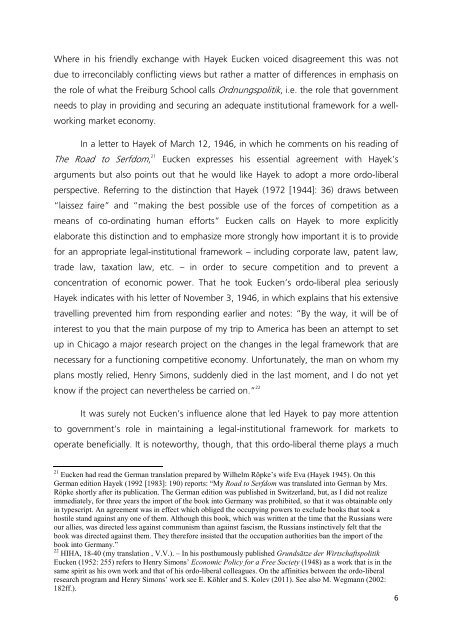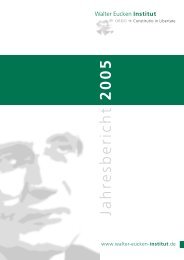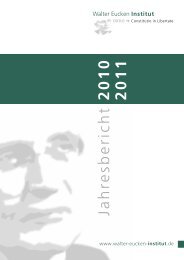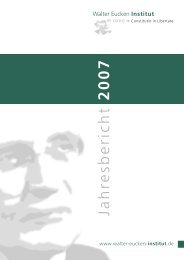Hayek in Freiburg - Walter Eucken Institut
Hayek in Freiburg - Walter Eucken Institut
Hayek in Freiburg - Walter Eucken Institut
Create successful ePaper yourself
Turn your PDF publications into a flip-book with our unique Google optimized e-Paper software.
Where <strong>in</strong> his friendly exchange with <strong>Hayek</strong> <strong>Eucken</strong> voiced disagreement this was not<br />
due to irreconcilably conflict<strong>in</strong>g views but rather a matter of differences <strong>in</strong> emphasis on<br />
the role of what the <strong>Freiburg</strong> School calls Ordnungspolitik, i.e. the role that government<br />
needs to play <strong>in</strong> provid<strong>in</strong>g and secur<strong>in</strong>g an adequate <strong>in</strong>stitutional framework for a well-<br />
work<strong>in</strong>g market economy.<br />
In a letter to <strong>Hayek</strong> of March 12, 1946, <strong>in</strong> which he comments on his read<strong>in</strong>g of<br />
The Road to Serfdom, 21<br />
<strong>Eucken</strong> expresses his essential agreement with <strong>Hayek</strong>’s<br />
arguments but also po<strong>in</strong>ts out that he would like <strong>Hayek</strong> to adopt a more ordo-liberal<br />
perspective. Referr<strong>in</strong>g to the dist<strong>in</strong>ction that <strong>Hayek</strong> (1972 [1944]: 36) draws between<br />
“laissez faire” and “mak<strong>in</strong>g the best possible use of the forces of competition as a<br />
means of co-ord<strong>in</strong>at<strong>in</strong>g human efforts” <strong>Eucken</strong> calls on <strong>Hayek</strong> to more explicitly<br />
elaborate this dist<strong>in</strong>ction and to emphasize more strongly how important it is to provide<br />
for an appropriate legal-<strong>in</strong>stitutional framework – <strong>in</strong>clud<strong>in</strong>g corporate law, patent law,<br />
trade law, taxation law, etc. – <strong>in</strong> order to secure competition and to prevent a<br />
concentration of economic power. That he took <strong>Eucken</strong>’s ordo-liberal plea seriously<br />
<strong>Hayek</strong> <strong>in</strong>dicates with his letter of November 3, 1946, <strong>in</strong> which expla<strong>in</strong>s that his extensive<br />
travell<strong>in</strong>g prevented him from respond<strong>in</strong>g earlier and notes: “By the way, it will be of<br />
<strong>in</strong>terest to you that the ma<strong>in</strong> purpose of my trip to America has been an attempt to set<br />
up <strong>in</strong> Chicago a major research project on the changes <strong>in</strong> the legal framework that are<br />
necessary for a function<strong>in</strong>g competitive economy. Unfortunately, the man on whom my<br />
plans mostly relied, Henry Simons, suddenly died <strong>in</strong> the last moment, and I do not yet<br />
know if the project can nevertheless be carried on.” 22<br />
It was surely not <strong>Eucken</strong>’s <strong>in</strong>fluence alone that led <strong>Hayek</strong> to pay more attention<br />
to government’s role <strong>in</strong> ma<strong>in</strong>ta<strong>in</strong><strong>in</strong>g a legal-<strong>in</strong>stitutional framework for markets to<br />
operate beneficially. It is noteworthy, though, that this ordo-liberal theme plays a much<br />
21<br />
<strong>Eucken</strong> had read the German translation prepared by Wilhelm Röpke’s wife Eva (<strong>Hayek</strong> 1945). On this<br />
German edition <strong>Hayek</strong> (1992 [1983]: 190) reports: “My Road to Serfdom was translated <strong>in</strong>to German by Mrs.<br />
Röpke shortly after its publication. The German edition was published <strong>in</strong> Switzerland, but, as I did not realize<br />
immediately, for three years the import of the book <strong>in</strong>to Germany was prohibited, so that it was obta<strong>in</strong>able only<br />
<strong>in</strong> typescript. An agreement was <strong>in</strong> effect which obliged the occupy<strong>in</strong>g powers to exclude books that took a<br />
hostile stand aga<strong>in</strong>st any one of them. Although this book, which was written at the time that the Russians were<br />
our allies, was directed less aga<strong>in</strong>st communism than aga<strong>in</strong>st fascism, the Russians <strong>in</strong>st<strong>in</strong>ctively felt that the<br />
book was directed aga<strong>in</strong>st them. They therefore <strong>in</strong>sisted that the occupation authorities ban the import of the<br />
book <strong>in</strong>to Germany.”<br />
22<br />
HIHA, 18-40 (my translation , V.V.). – In his posthumously published Grundsätze der Wirtschaftspolitik<br />
<strong>Eucken</strong> (1952: 255) refers to Henry Simons’ Economic Policy for a Free Society (1948) as a work that is <strong>in</strong> the<br />
same spirit as his own work and that of his ordo-liberal colleagues. On the aff<strong>in</strong>ities between the ordo-liberal<br />
research program and Henry Simons’ work see E. Köhler and S. Kolev (2011). See also M. Wegmann (2002:<br />
182ff.).<br />
6








